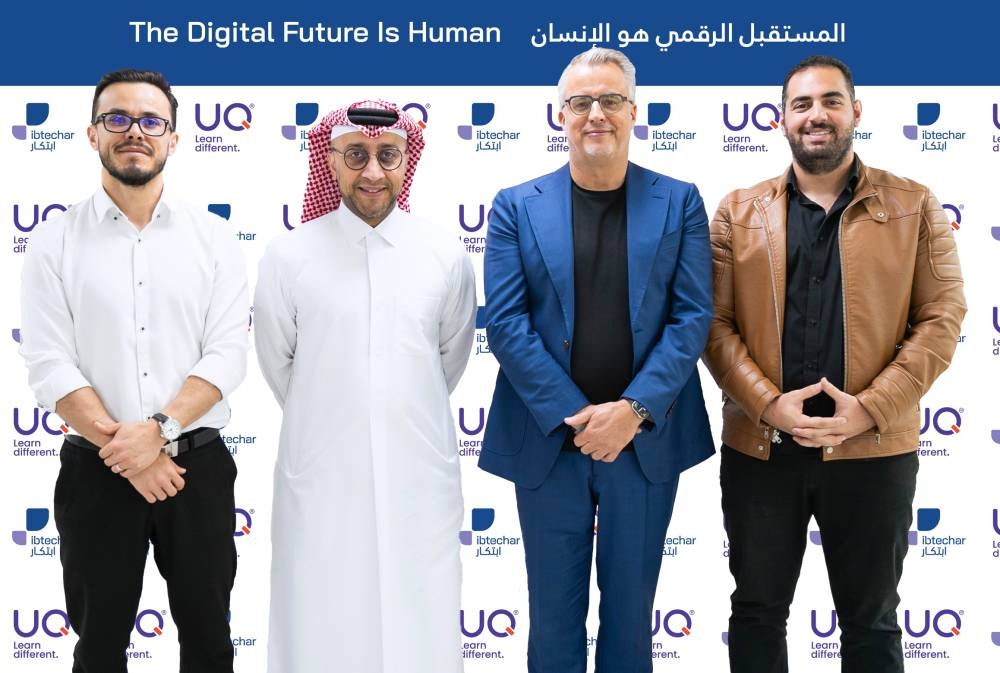Ibtechar and its strategic partner, Belgium-based digital skills assessment firm UQ, will lead the development and implementation of the ‘Common Digital Skills Framework’ in Qatar.
The framework, which will be established under the sponsorship of the Ministry of Communications and Information Technology (MCIT), will form an essential link between individuals, organisations, and training providers to evaluate, identify, and address upskilling and reskilling needs of Qatar’s labour market in line with the evolving demands of the digital age.
A first-of-its-kind initiative in Qatar and the region, the framework will advance common digital skills across all levels of society by engaging schools, universities, businesses, and government entities. It will emphasise the critical value of common digital skills in enhancing the digital readiness and engagement of Qatar’s population, while significantly aiding the development of a digitally-empowered national workforce.
Within the framework, common digital skills will be divided into two distinct categories: primary digital skills and digital enabling skills. Primary digital skills include those related to IT landscape, hardware, software, data, automation, security and safety, IT compliance, digital marketing, technology management and digital strategy. These will be complemented by broader competencies that enhance one’s ability to interact with digital technologies, such as creativity and innovation, digital communication, self-management, digital organisation, agility and project management.
Nayef al-Ibrahim, CEO and co-founder of Ibtechar, said: “The project marks a significant step forward in our journey to facilitate Qatar’s transition into a knowledge-based society – as envisioned in Qatar National Vision 2030 and foster the nation’s growth as a leader in digital literacy.
“We are thrilled to collaborate with our international partner, UQ, to achieve the long-term objectives of the framework in shaping a highly competitive and digitally-advanced workforce in Qatar, which will drive further innovation, efficiency, and productivity in both the public and private sectors.”
Thierry Lescrauwaet, CEO of UQ, commented: “The framework holds tremendous value in today’s technology-driven world by providing a structured approach to adapt to technological advancements, empowering the workforce by enhancing digital skills, and increasing organisational competitiveness. It enables data-driven decision-making for individuals and organizations to enhance their efficiency in the dynamic digital environment.”
Over the next three and a half years, Ibtechar will work together with its international partners, such as UQ to craft a comprehensive and culturally relevant framework aligned with local needs and global standards. During the training phase, Ibtechar will focus its efforts on training educators, professionals, and the general public through a combination of workshops, online courses, and interactive sessions to cater to diverse learning needs and skills requirements.
To ensure digital skills are instilled in students from an early age, Ibtechar will collaborate with educational institutions and universities to integrate the Common Digital Skills Framework within their curriculum. A series of awareness and engagement campaigns will be held to raise awareness of the value of digital skills in an increasingly digital world.
UQ will provide strategic support throughout the project focusing on designing standardised tests and validation processes, developing the accreditation and audit process for organisations adopting the framework, defining the online presence of the framework, and leading on strategic planning, logistical considerations, and ensuring a smooth transition from the framework development phase to full-scale implementation.
Other focus areas of the initiative entail supporting organisations to embrace the framework as part of their digital transformation journeys, implementing a robust monitoring and evaluation system to assess the impact of the framework on digital literacy in Qatar, continually enhancing the framework to match new trends and technologies, and building a sustainable model for digital skills advancement in Qatar.
Business
Ibtechar, UQ to co-develop ‘common digital skills framework’ advancing Qatar’s digital future

Nayef al-Ibrahim, CEO and co-founder of Ibtechar, and Thierry Lescrauwaet, CEO of UQ, are joined by the rest of the team.
